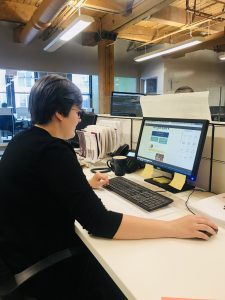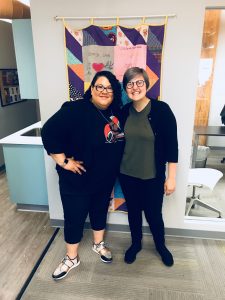When applying to be a CAPS Fellow, I had a limited understanding of what that meant. I knew from former Fellows that it meant interning at “real” job, travelling to that “real” job, and spending my summer gaining some experience. But, just what exactly was that job? Where would I be going? Staying? Doing? To be honest, those questions are hard to answer. The best way to understand it is to experience it.
The first day I started at Ingenuity was the first day that I really understood what that non-profit does, and, really, I don’t think anyone could have explained it to me beforehand. There’s a process, I’ve learned, that comes with entering a new space (a new workplace). It’s a whole new environment, and, to do the job right, you need a lot of context for why your colleagues do the work they do and why. Before arriving, I browsed their website and googled the work they did in the past, but I began to understand more just by being there.
What do I mean by that? I mean: you learn most about your CAPS Fellows placement just by listening in on meetings, listening to your colleagues chat about the work, and having your colleagues explain to you how their work contributes to the larger trajectory of the organization.
And, please, ask questions!! It’s really easy to let yourself feel like you’re not qualified or as experienced as your colleagues, and that might make you feel like you should remain quiet so as to not disrupt the work going on, but don’t! In my experience, folks are so happy to bring you into the conversation. They want your input! So, if there’s clarification that you need in order to make meaningful contributions to the conversation, by all means ask for it!
At Ingenuity, I’ve learned (through asking questions) that the organization’s goal is to bring arts education to every Chicago Public Schools student. One of the questions I asked: “How does Ingenuity do that?” Once I learned that Ingenuity is the Chicago ‘hub’ that tracks arts partners (organizations like: museums, galleries, creative working studios or any places that provide access to arts education) and teaching artists (in the classroom) at every school, I could then ask questions like, “What resources does Ingenuity provide that connects arts partners and teaching artists?” Their response is: Ingenuity provides several training sessions available to both partners and teachers throughout the year in order to inform them how they can use Ingenuity’s resources to their benefit (like arts grants), advocate for the continuance and addition of arts ed in schools, and much more. After learning the basics, through asking questions, I was able to not only understand the work that was going on but also where I could contribute to the conversation. It was because I asked questions that I got myself assigned to developing one of the training sessions I was most interested in (storytelling as an advocacy tool!).
So, just relax, believe in your own ideas, and trust that people want you to succeed, and then you’ll have an amazing time at your CAPS placement, meeting tons of wonderful people!

